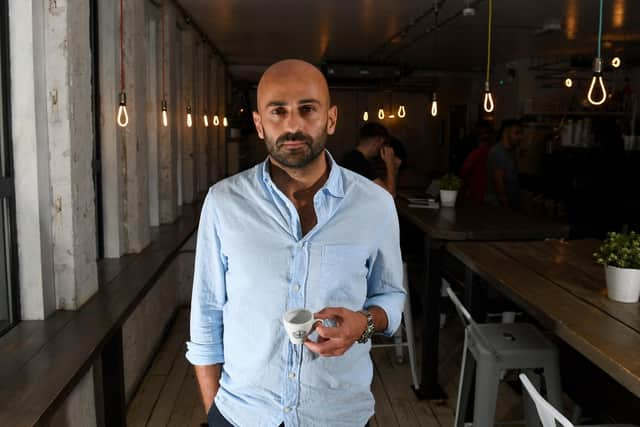How Yorkshire's towns and city centres could be at risk of being 'hollowed out'
and live on Freeview channel 276
Business and political leaders have been urged to ensure that town and city centres in Yorkshire are not “hollowed out” and left to slip into a sharper decline after witnessing an exodus of workers due to the coronavirus pandemic.
The crisis caused by the virus has had a devastating impact on the nation’s economy with hundreds of thousands of jobs already lost and consumer spending dramatically undermined.
Advertisement
Hide AdAdvertisement
Hide AdMany employees are continuing to work from home in the wake of the lockdown, leaving offices empty and prompting grave concerns for the future of city and town centres across the country.


KPMG UK’s head of property, construction and building products for the North, Giles Taylor, warned businesses are in “unchartered waters”, with most likely to look to reduce office space after successfully moving to home-working.
Mr Taylor confirmed many companies are beginning to rethink the traditional models of working and it is clear some will look to reduce their office space.
He added: “Nobody wants to see our region’s town and city centres hollowed out. To ensure they remain vibrant and successful, the business community will need to work closely with civic leaders on strategies that enable a more flexible working world, without damaging Yorkshire’s retail and leisure industries.”
Advertisement
Hide AdAdvertisement
Hide AdA majority of businesses have signalled their intention to return to offices, with 63 per cent of organisations in Yorkshire already heading back to the workplace, according to the Hays UK recruitment consultancy.


In the next three months, 16 per cent of employers in Yorkshire expect their workforce to be fully working in the office, 22 per cent expect staff to be fully remote and 59 per cent expect a mix of remote and in the office working.
However, Britain this week collapsed into its largest recession on record after the lockdown sparked a 20.4 per cent contraction between April and June in the biggest slump of any major global economy.
It also emerged this week that 730,000 workers have been removed from the payrolls of British companies since March when the lockdown began.
Advertisement
Hide AdAdvertisement
Hide AdBefore the pandemic, hospitality provided 210,000 jobs in Yorkshire and equated to eight per cent of regional employment, according to the trade body, UK Hospitality.


Its chief executive, Kate Nicholls, said: “Hospitality is hugely important to Yorkshire’s economy.
“A major blow to hospitality in the area would be significant damage to the local economy.”
Skipton Building Society, which usually has 1,500 employees operating out of its headquarters, currently only has 200 staff at the office at any given time. Its CEO David Cutter said the firm envisages that number will increase to 350 by the autumn.
Advertisement
Hide AdAdvertisement
Hide AdThe Federation of Small Businesses has called on councils in Yorkshire and the North of England to distribute £1.5bn of funds to small businesses in a “fast and timely manner”.


The FSB’s chairman, Mike Cherry, said: “In all areas where offices remain closed, those firms nearest continue to suffer, and those locations faced with localised lockdowns face an uphill struggle for survival.”
Labour has urged the Government to redeploy funding from its business grants programme rather than clawing it back “prematurely” from local authorities, as part of a Hospitality and High Streets Fightback Fund.
Call for UK’s real estate sector to alter and adapt
The real estate sector will need to drastically change and shift away from “feudal and archaic systems and thinking” as a result of the coronavirus pandemic, according to a leading property expert.
Advertisement
Hide AdAdvertisement
Hide AdThe nation’s economy has been decimated by the virus, with the UK this week plunged into the worst recession on record.
Major businesses and small independent traders have had to overhaul their working practices to survive the outbreak, with employees given an unprecedented opportunity to work from home during the lockdown.


Chris Kane, who was responsible for helping the BBC move to Salford, believes the Covid-19 outbreak will be a catalyst for a different approach to the leasing system going forward.
He said: “Although I’m a long- standing chartered surveyor, my industry doesn’t understand its customers. It doesn’t operate at all in the 21st century. It’s bound by feudal and archaic systems and thinking.
Advertisement
Hide AdAdvertisement
Hide Ad“If you think of the label landlord and tenant – they are from the Middle Ages. Many will be struggling to pay rent quarterly in advance. Nobody pays things in advance now.
“The real estate sector is the last major part of the economy which has not been subject to disruption. Covid-19 has come along and given it a mother and a father of a challenge.”
Rents in Yorkshire are predicted to fall sharply across the office and retail sectors in the year ahead.
The Royal Institution of Chartered Surveyors’ UK commercial market survey showed that 93 per cent of respondents envisage businesses scaling back their office footprint over the next two years as people move to home working. However, 64 per cent feel offices will increasingly move out to the suburbs.
Advertisement
Hide AdAdvertisement
Hide AdDespite this, prime office rents in Leeds grew 6.7 per cent in the first half of the year and now stand at £32 per sq ft, according to research from Savills.
Mr Kane said he believes businesses could adopt more localised offices in places such as the suburbs where their staff are already located. This way staff members can be closer to their family and do a couple of days at the office while working the rest of the week from home.
Mr Kane said: “The real estate and facilities management industry needs to move away from treating buildings as just assets and towards providing space as a service.”
The huge impact that coronavirus has had on the economy was laid bare this week when figures from the Office for National Statistics on Wednesday showed 730,000 workers have been removed from the payrolls of British companies since March when the lockdown began.
Advertisement
Hide AdAdvertisement
Hide AdChancellor Rishi Sunak admitted the latest figures “confirm that hard times are here”.
But predictions by some that Covid-19 will lead to the end of the office are overblown, according to Mr Kane, the former vice-president of international corporate real estate for The Walt Disney Company.
“We’re not going to see the death of the office,” he said.
Well-known companies such as Twitter made headlines when they announced that their staff would be allowed to work from home.
But Mr Kane said they are “certain companies at certain points in their respective life-cycles”.
Advertisement
Hide AdAdvertisement
Hide Ad“It’s not a one-size fits,” he said, and claimed property firms will simply have to adapt and change, deploying office space in a more efficient way.
A part of the sector likely to see continued growth is flexible office space.
Mr Kane predicted in his upcoming book, Where is My Office?, which was written pre-coronavirus, that flexible office space would account for 50 per cent of the market.
He said: “Businesses will not want to have long-term commitments.
Advertisement
Hide AdAdvertisement
Hide Ad“The smart businesses will be thinking about a distributed workforce strategy where they can employ people on a very different basis.”
Where is my Office?: Reimagining the Workplace for the 21st Century by Chris Kane is published on October 15 2020 by Bloomsbury Business.
‘I had to stop and dry my tears before I came in – I didn’t want the staff to see them’
In 2009, Alex Galantino decided to bring a little taste of the coffee culture that defines his home country to the heart of Leeds. After opting to leave a career in IT following a major health scare, Mr Galantino launched his cafe business with inspiration from Milan.
Advertisement
Hide AdAdvertisement
Hide AdLa Bottega Milanese quickly found a loyal following as Britain was beginning to wake up to the idea of good quality coffee.
However, that dream of bringing a slice of Milan has seen Mr Galantino face one of the most testing periods of his business life.
Heading into the coronavirus pandemic, La Bottega Milanese had two shops and 22 employees. However, following the outbreak, the business had to shut its branch at The Light, and staff numbers had to be culled to just seven.
Mr Galantino said: “It was very emotional. The day that we closed, I was around the corner with tears in my eyes. I had to stop and dry them before I came in because I didn’t want the staff to see it.
Advertisement
Hide AdAdvertisement
Hide Ad“It hit me. It wasn’t emotion as such, it was nerves. After all, this the business was just being taken away from me through no fault of my own.”
When it reopened its remaining shop in Bond Court, in the middle of Leeds’s business district, La Bottega was confronted with a situation that had shifted dramatically. All office workers had disappeared, and the once well-frequented coffee shop was marooned amidst a host of empty high-rise blocks.
Footfall from the offices is “everything” for the business, says Mr Galantino. “We feed off the offices – it’s that simple”.
A short walk away through the city centre, Mad Frans bar and restaurant is in an even bigger predicament.
Advertisement
Hide AdAdvertisement
Hide AdThe restaurant is based at the up-and-coming Wellington Place development. About 6,000 public servants were set to move into the new HMRC building next door.
Owner Ryan Fraser said: “Business is heavily influenced, Monday to Friday, by office workers. That is our trade.
“Monday to Friday, there is no other trade. It is just purely the workers at Wellington Place, down Wellington Street and also Whitehall Road.”
The restaurant has been reduced to operating at just the weekend as a result of businesses working from home. Staff are now pinning their hopes on office footfall picking up in September as schools reopen.
Advertisement
Hide AdAdvertisement
Hide AdMr Fraser added: “It’s very scary. We even contemplated whether we would reopen because of where we are based. We are not in what I would call the city centre loop.”
It makes attracting passing trade difficult as people do not frequent that particular area of the city centre without a need to be there.
There is also the additional cost of implementing social distancing, which also restricts how many people Mad Frans can serve at the weekends.
Despite signing a 12-year lease just last year, Mr Fraser admitted he could be forced to start contemplating closing permanently.
Advertisement
Hide AdAdvertisement
Hide AdHe believes his business could continue to the beginning of November as things stand by just opening at the weekends.
“If it gets to that point then it’s a case of is it worthy of carrying on, which is the big question,” he says.
In the centre of York stands a regeneration project that uses recycled shipping containers to develop business space for start-ups and small businesses.
Spark:York was a vibrant mix of food, retail and community space until the pandemic. Since then it has been operating at a reduced capacity.
Advertisement
Hide AdAdvertisement
Hide AdIt too has seen a drop in office footfall, but tourist trade has helped offset that to a degree in recent weeks, with the development benefitting from its open air environment.
Spark:York co-founder Tom McKenzie said: “In terms of that heavy footfall from office traffic, that is still obviously reduced.
“A lot of the larger firms in York have not invited their staff back into the office and I don’t see that happening any time soon.”
The site is, however, seeing an upturn in people either on furlough or working from home coming to spend lunchtimes there.
Advertisement
Hide AdAdvertisement
Hide AdNot having the office traffic for a prolonged period would be “extremely damaging”, according to Mr McKenzie, but the Eat Out to Help Out scheme is providing additional footfall in the interim.
It is also likely to see independent businesses reliant on office footfall becoming more innovative.
Back at Bond Court, Mr Galantino, a pragmatic businessman, is continuing to be proactive. He has plans to split his team during the winter flu season.
A concept that he is toying with is having a more office-orientated environment where business people work from.
Advertisement
Hide AdAdvertisement
Hide Ad“There is an opportunity there to slightly pivot,” he said. “Rather than becoming a coffee shop that is used as an office, it’s an office that is used as a coffee shop.”
September will be a key month for businesses such as La Bottega Milanese.
Mr Galantino said: “What I’m hearing from the office managers and office agents in the city is that they are absolutely not going to come back until at least September, and even then it’s going to be 25 per cent.
“How can you go back if you’ve got children at home and nurseries are closed? There are people who just can’t go back.”
Advertisement
Hide AdAdvertisement
Hide AdThere is growing anecdotal evidence that cafes and restaurants in the suburbs have been the beneficiaries of office closures.
“The coffee shops in the suburbs are now thriving,” Mr Galantino said. “We are now also seeing evidence of very interesting and quirky shared office concepts opening in suburbs like Headingley.”
Mr Galantino has been asked if he would consider a switch to the suburbs.
But he said: “What I’m passionate about is the urban dynamics. We have opened this coffee shop because I’m from Milan city centre.
Advertisement
Hide AdAdvertisement
Hide Ad“I will try till the last day to come up with a different concept and stay in the thick of it.”
Whatever the long-term future holds for businesses serving office districts, a meaningful return to workplaces cannot come soon enough for them.
Home working: ‘We’ve closed the office and productivity has increased’
The shift away from a traditional office environment may have seemed unthinkable for many businesses just six months ago.
Advertisement
Hide AdAdvertisement
Hide AdHowever, the coronavirus pandemic has changed the dynamic of the business world and My Management Accountant is among the companies that have opted to do away with offices.
The Huddersfield-based accountancy has 10 employees and was established by Martin Bown in 2011. The firm took its first office space in 2013.
Mr Bown said the business decided to drop its space in the town centre for several reasons and added: “We’re a cloud-based business anyway. Moving to working out of the office wasn’t a challenge.
“Productivity hasn’t dropped. If anything, it has improved. Team morale has improved as well. On that basis I thought there’s no need for us to be driving to a physical office.
Advertisement
Hide AdAdvertisement
Hide Ad“Then there is what’s going on at the moment. We were going to have some child-care issues over the summer holiday period so staff would have struggled to come into work.”
The business has kept a small meeting room should a staff member want to come into the town centre.
In the future, Mr Bown would like to have a meeting space where the whole team can get together, have lunch and spend time together.
“Once every fortnight we can come together as a team,” he said. “We can bring in local clients and we’ve got clients nationwide. It’s not going to affect our client base.”
Advertisement
Hide AdAdvertisement
Hide AdThe spectre of transmission of the virus still looms over many businesses and it was a factor in Mr Bown’s decision to switch to permanent home working.
He said: “I’m not entirely clear on the rules if in an office of 10 people there is one person who shows the symptoms. Do we all go home for two weeks? We weren’t tied into a lease, so we’ve moved out.”
Mr Bown does not believe the shift to home working will hinder the development of his staff and the firm is in the process of taking on a new apprentice.
He said: “I’m not going to pretend that it’s not a challenge. As a business of accountants, we’ve got a number of staff who are going through different levels of accounting qualifications.
Advertisement
Hide AdAdvertisement
Hide Ad“They are already in the individual mindset of wanting to learn, study and continue their professional exams.”
He added that video conferencing was playing an important part, with virtual meetings running throughout the working day.
He said: “We can sit and work away. You’ve effectively got somebody sitting next to you all day.”
Work policies: Women more likely to lose their jobs and rights, lawyer warns
Advertisement
Hide AdAdvertisement
Hide AdWomen are at risk of being treated unfairly when it comes to work from-home policies, a lawyer has warned, as many companies overhaul their business practices in the wake of coronavirus.
Hannah Strawbridge said women have proven they can do the same work from home, but many businesses still have a “toxic” and “controlling” environment that will not allow them to do so.
She said: “When it comes to women in the workplace, the statistics are very disturbing in terms of the denigration of women’s rights in the workplace as a result of Covid-19.
“There was a survey recently that showed women are 50 per cent more likely than men to lose their jobs as a result of Covid-19. The reasons were that they were more likely to be made redundant but also they are more likely to quit their jobs due to Covid.”
Advertisement
Hide AdAdvertisement
Hide AdOne of the biggest factors is that women still shoulder most of the household responsibilities, according to Ms Strawbridge.
She said there are concerns that those who have proven they can work successfully from home will be forced back into offices.
The Halifax-based lawyer said: “There will be so many women who have shown that they can work from home, their job doesn’t have to be done in the office.
“The business is benefitting from it and saving costs and those women are more able to juggle childcare, particularly when they go back to school in September.
Advertisement
Hide AdAdvertisement
Hide Ad“They don’t have to do a commute, they don’t have to do a nine-to-five job when school starts at nine.
“It’s going to be quite interesting to see whether businesses that try to enforce or encourage their staff to come back into the office, are women going to be more likely to make more flexible working applications?”
Mr Strawbridge herself quit a number of jobs before setting up her own legal business as firms were not accommodating to the working mother.
“I left a number of jobs because it was just impossible and made me feel guilty and awful as a mum,” she said.
Advertisement
Hide AdAdvertisement
Hide AdShe concedes that there are industries where workers would need to meet at offices but cannot see why they should be based there for the whole week.
Ms Strawbridge added: “I feel deep down, there are still a lot of industries and businesses who think that when certain employees are at home they are watching Jeremy Kyle instead of working.
“I just know that from my own background of the law. That’s exactly how it is. A lot of that is to do with wanting to control staff and also quite toxic work cultures, which really shouldn’t have a place in 2020.”
Transport concerns: ‘Spontaneity is difficult with people not working in the same place’
Advertisement
Hide AdAdvertisement
Hide AdA key factor of home working has been the use of video conferencing facilities such as Microsoft Teams and Zoom.
That has certainly been an important part in the transition to working from home for Richard Michie and his small Leeds-based marketing business.
The founder of the Marketing Optimist said: “We transitioned a week before lockdown because I was testing the temperature of what was happening. Then actual lockdown kicked in. We’ve been working at home for over four months now.”
Even though the business consists of a small team of three people, Mr Michie was concerned that they would lose that team cohesion and so they deployed daily Zoom calls.
Advertisement
Hide AdAdvertisement
Hide Ad“But that got quite exhausting and quite stressful because effectively the whole team was spending five hours a week on a Zoom call,” Mr Michie said.
The entrepreneur, who is based at the shared Wizu Workspace, is looking forward to returning to the office.
While Mr Michie can drive into the city centre, his two staff rely on public transport.
He said: “That’s still an issue with limitations on the number of people allowed to use public transport. We have to look at staggered start times and ending times.
Advertisement
Hide AdAdvertisement
Hide Ad“We are saving more time by the fact that nobody has to leave the house at 7.30am or 8am to try and get here for 9am because they can be straight online at 9am.
“But it’s a challenge, especially for a creative business like ours, to keep that creativity going. That spontaneity is difficult with people not working in the same place.”
Mr Michie is not sure how the current situation with transport can accommodate a return to normal office working given the need for social distancing.
He said: “The only way they could improve that would be to improve public transport in the North and in Leeds when it comes to efficiency and maybe volume of routes so that you can get more public transport moving.
Advertisement
Hide AdAdvertisement
Hide Ad“It’s a definite concern. I’ve driven in today and parked. If that becomes the norm because people can’t use public transport then obviously we’ll have a lot more congestion, a lot more air pollution. The city goes back to being a mess again.”
In the long run, Mr Michie, like a lot of other business owners, hopes to deploy a mixed approach of home and office working.
“A lot of businesses are going to move to that blended way of working,” he said.
Suburbs: Hospitality outlets out of town see surge in their popularity
Advertisement
Hide AdAdvertisement
Hide AdHospitality and retail businesses based in the suburbs are seeing a surge in popularity as lockdown is eased and offices could follow suit by moving out of city centres.
Blondes, a vegan cafe in Cottingham, near Hull, has been one beneficiary of businesses working from home. Willow Boyle, inset, the co-founder of Blondes, said the cafe has never been busier, especially in the middle of the week.
She said: “Initially it was horrific. We’ve been here 17 years. My whole life revolves around the cafe and I was absolutely devastated because we’ve never shut for a day apart from my grandma’s funeral.”
But since reopening, initially just as a takeaway, the cafe has attracted a new customer base with many coming in while on furlough or on a break from home working.
Advertisement
Hide AdAdvertisement
Hide AdMs Boyle said: “We’ve got a whole new customer base since we reopened. Obviously being here for 17 years we get to know our customers really well and we’ve seen so many new faces. It’s been absolutely fantastic.
“We’re a friendly place and we like to chat to our customers. We make friends with our customers.
“We are finding a lot of them are working from home and have been told they will be working from home, maybe until next year.
“One of our customers has been told she won’t be going back to the office until at least February. She has been coming in every day, whereas we maybe saw her once a week before. The working from home trend has made a definite difference to our business.”
Advertisement
Hide AdAdvertisement
Hide AdThis has been supplemented by people wanting to support local businesses and also being reluctant to travel on public transport.
“There’s a real buzz locally, which we haven’t felt for years and years,” Ms Boyle said.
“We had Costa Coffee open across the road from us about six years ago. That was obviously a big worry.
“We have found that a lot of people are now wanting to support local businesses like ours because of the pandemic.
Advertisement
Hide AdAdvertisement
Hide Ad“There’s been a turnaround with people wanting to shop local.”
Ms Boyle expects the trend of working from home to continue benefiting small businesses in the suburbs.
She added: “People are changing their habits and finding new ways of working because I don’t think this is going to leave us any time soon.
“No matter what, we’re going to be stuck with Covid-19 for quite some time.”
Comment Guidelines
National World encourages reader discussion on our stories. User feedback, insights and back-and-forth exchanges add a rich layer of context to reporting. Please review our Community Guidelines before commenting.